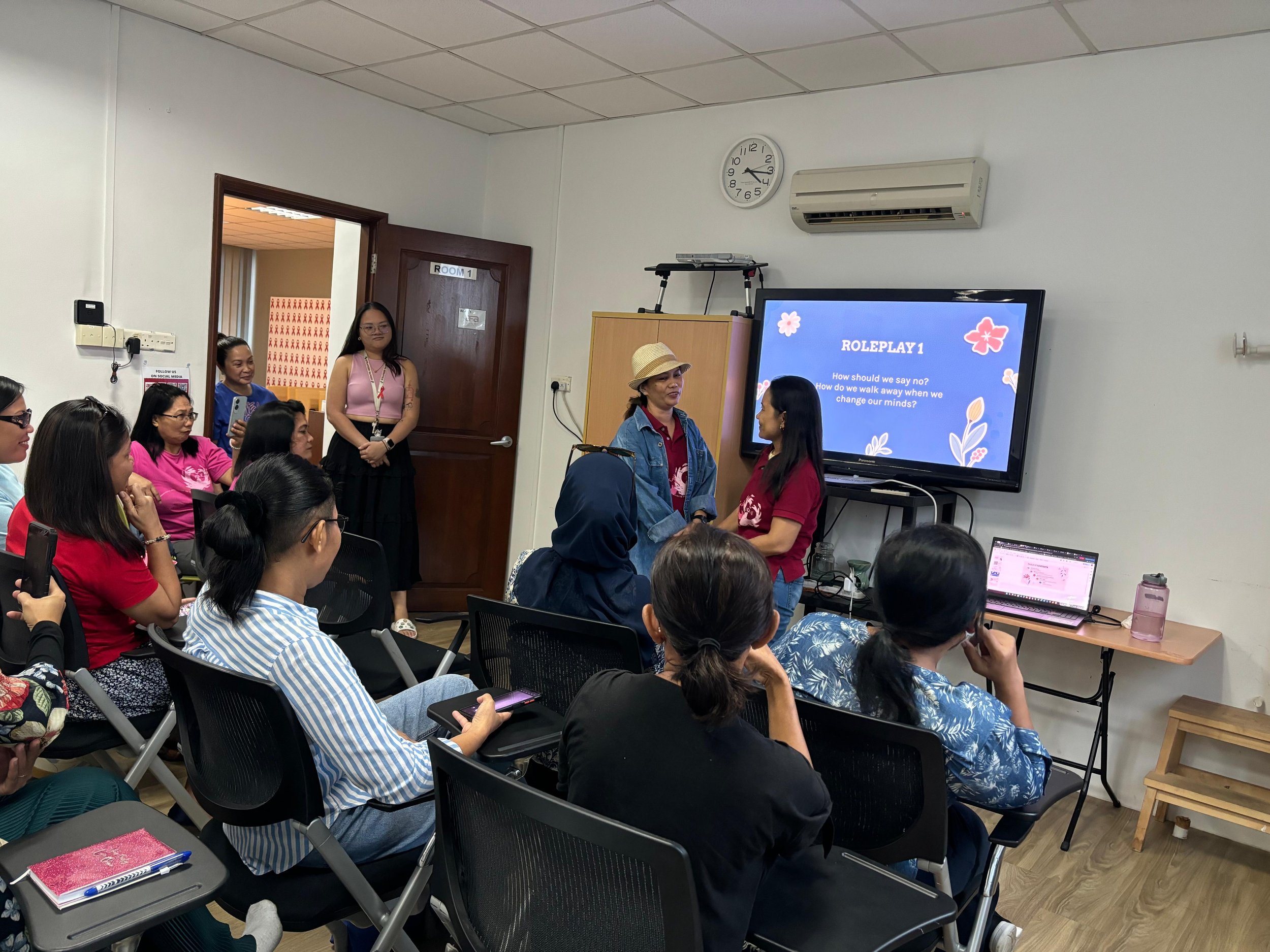Let’s Talk About Sex(ual Health): HOME-AfA Sex Education Workshop
On 4 August 2024, HOME and Action for Aids (AfA) jointly held a sex education workshop for migrant domestic workers (MDWs). The session, attended by around thirty MDWs, touched on topics related to sexual and reproductive health. HOME’s casework intern, Jessie Lim, who spearheaded the workshop, shares her thoughts on how the workshop developed and the need for regular access to such vital information.
It’s a wrap! A successful sex education workshop co-organised with HOME Roses and AfA.
My Motivation
What drove me to conceptualise this workshop was the need to address the significant sexual and reproductive health issues MDWs in Singapore face. I have personally heard from workers who’ve shared their concerns on health-related issues, including those related to sexual health.
The difficulties MDWs face in accessing information about sexual and reproductive health is tied to the regulatory landscape in Singapore, in which pregnancy for domestic workers is criminalised. Singapore’s current regulations do not permit MDWs to be pregnant: one news article reported that an estimated 170 MDW pregnancies are detected annually by the Ministry of Manpower. However, this figure could be higher due to the likelihood of some MDWs hiding their pregnancies, including through resorting to illegal abortion methods. MDWs face mandatory pregnancy tests every six months, meaning that once a pregnancy is detected, these women face dismissal and repatriation, as well as being potentially blacklisted and barred from working in Singapore. This can lead to scenarios where women may feel pressured into coercive abortions or find themselves without access to safe reproductive health services, putting their health at risk.
When I found out that HOME had previously hosted similar workshops with partners like the Health Promotion Board (HPB) and Action for AIDS (AfA), I was keen to revive this initiative to meet what I feel is an unmet need of MDWs. I then met with HOME Roses, a community group of domestic workers supported by HOME, whose mission is to increase health awareness among MDWs through organising health talks and other health-related activities.
A Lively and Engaging Workshop
In curating the topics, we chose issues we felt reflected the most pressing sexual and reproductive health issues MDWs face. The goal of the workshop was to equip them with the knowledge and tools they need to protect their health and well-being, and empower them to make informed decisions.
Consent: MDWs often face power imbalances when negotiating their boundaries. Understanding of consent is key to navigating these boundaries, to enable them to give consent freely and in an informed manner.
Condom-Wearing Demonstration: This practical demonstration was chosen to teach safer sex practices. Focus was placed on the correct way to use condoms and understanding the reasons behind condom failure, which is crucial for reducing the risk of unintended pregnancies and sexually transmitted infections (STIs).
Menstrual Cycles and Pregnancy: This was included to help participants gain a better understanding of their menstrual cycles and how pregnancy occurs. The knowledge will help them understand their bodies better, and allow them critical information needed to track bodily changes.
Sexually Transmitted Infections (STIs): MDWs’ job security and health are threatened if they test positive for syphilis or HIV during their six-monthly medical examinations. Hence, learning about and understanding the different types of STIs is essential knowledge.
To kickstart the discussion on informed consent, HOME Roses created two skits based on their real experiences surrounding consent: How should we say no? How do we walk away when we change our minds?
HOME Roses’ skit to initiate a discussion around consent, including when under pressure from a partner to have unprotected sex.
HOME Roses brought bananas and recruited volunteer participants to take part in the demonstration on how to properly wear a condom: which is the correct side; common reasons for condom failure; how wearing two does not mean “double protection”, and more. This hands-on session was interactive and informative, and filled with good-natured bantering.
Talk about a hands-on workshop: volunteers demonstrating how to wear condoms the proper way!
Following that, an AfA representative gave a useful STIs #101, in which they went through what STIs are, how they are spread, and also did a little quiz to correct misconceptions about STIs (e.g. “I’ll know if I have an STI because I’ll have symptoms”: false!).
An AfA representative addressing common myths about STIs, and the importance of preventive care.
The workshop concluded with a Q&A session with a volunteer doctor recruited by AfA. This session was particularly lively, with participants showing strong interest in discussing STIs, PAP smears, birth control methods, and side effects. These topics clearly resonated with the participants and were areas where they sought more knowledge.
The volunteer doctor recruited by AfA was inundated with questions during a lively Q&A session.
Key Takeaways & Reflection
Post-workshop feedback from the participants highlighted a need for easy access to sexual health information: participants indicated interest in learning more about topics such as STIs, reproductive systems, and birth control options. They also expressed a desire to learn more about cancers, with a large interest in PAP smears, the side effects of birth control and chronic diseases. These additional areas of concern could potentially be addressed in future workshops, and almost all participants indicated they would like to attend more of such workshops.
The workshop was a valuable opportunity to address important topics related to consent, sexual health, and contraceptive use among MDWs. The collaboration with AfA and HOME Roses ensured the information was not only accurate, but also relatable and culturally sensitive.
While this workshop has opened up important conversations, more needs to be done. Many participants demonstrated an awareness of the importance of testing and preventive care, but there remains a significant gap in knowledge about where and how to access these resources. This points to a broader issue regarding access to healthcare for MDWs in Singapore, in which notions of healthcare need to be expanded to include sexual and reproductive health.





